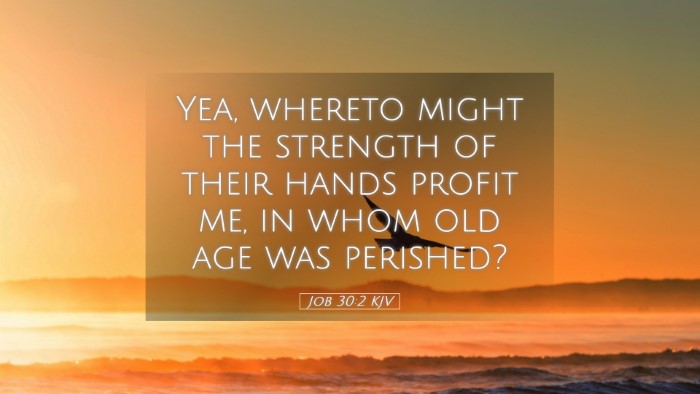Commentary on Job 30:2
Job 30:2 (ESV): “A senseless and nameless brood, what could they teach me? How could they speak to me?”
Contextual Background
The Book of Job is considered one of the oldest texts in the Bible, presenting profound reflections on suffering, righteousness, and divine justice. Job, a man of integrity, experiences unimaginable loss and pain. In his discourse, Job articulates both his confusion and anguish as he engages in dialogue with his friends and, ultimately, with God.
Verse Analysis
In Job 30:2, Job is reflecting on his current state of humiliation compared to his previous status. This verse stands as a plaintive acknowledgment of the mockery he faces from younger, less experienced men whom he refers to as "those whose fathers I would have disdained to set with the dogs of my flock". This contrast highlights Job's feelings of contempt and derision towards those who now seem to look down upon him.
Matthew Henry's Insight
Matthew Henry comments on the depth of the decline Job has undergone. Once esteemed and held in high regard, Job's situation now elicits scorn from those he once considered beneath him. Henry points out that this serves as a psychological torment for Job, as the criticisms from lesser individuals cut deeper than the loss itself.
Albert Barnes' Interpretation
Albert Barnes emphasizes the emotional and spiritual desolation reflected in this verse. He notes that these "senseless" men lack the wisdom and understanding that Job held in his more prosperous days. Barnes elucidates how Job’s pain is exacerbated by the presence of these men who dare to speak into his suffering with their unearned presumptions and judgments.
Adam Clarke's Commentary
Adam Clarke examines the characteristics of the people Job is referring to, highlighting their youth and lack of experience. Clarke suggests that their ignorance makes them arrogant, judging Job without understanding the depth of his afflictions. Job’s disdain for their opinions reflects a universal truth about human interactions during hardship—those who suffer often feel isolated and misunderstood by those who have not experienced similar trials.
Theological Implications
- Human Suffering: Job's experience reflects the reality of suffering and its capacity to alienate individuals from their communities.
- Perception vs. Reality: How others perceive our struggles does not always align with the truth of our experience.
- Wisdom in Adversity: True wisdom comes from experiencing and understanding pain, not merely judging from a distance.
- The Role of Community: The reactions of Job's friends demonstrate both the potential for support and the failure of empathy in times of crisis.
Reflective Applications for Modern Readers
For pastors, theologians, students, and scholars, Job 30:2 serves as a poignant reminder of the importance of compassion in ministry and study. It encourages the understanding that authority in discussion about suffering must be rooted in experience, wisdom, and empathy.
Additionally, as modern readers reflect on Job's contempt for the advice of the unqualified, they might consider how often society turns to those lacking depth for guidance. It beckons a call for deeper discernment in choosing whom to listen to in times of difficulty, emphasizing the need for true wisdom that arises from lived experiences rather than superficial knowledge.
Conclusion
Job 30:2 provides a window into the heart of suffering—where the pain of loss provokes disdain for shallow judgments and the voices of the unworthy. As we engage with this text, may we strive to be voices of understanding, support, and wisdom, reflecting God's compassionate heart in the face of human suffering.


